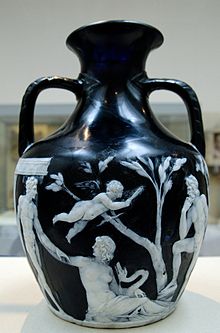Atia
Atia († second half of 43 BC ) was the mother of the Roman emperor Augustus and the niece of Gaius Iulius Caesar . To distinguish it from her younger sister, she is sometimes called Atia maior ("the older one").
Life
Atia was the elder daughter of Marcus Atius Balbus and Iulia , Caesar's sister. Her first marriage was to Gaius Octavius , with whom she had two children, the daughter Octavia Minor and Gaius Octavius Thurinus, who later became Augustus. After the death of her husband, Atia married Lucius Marcius Philippus ( consul 56 BC). When her son Octavius 44 BC After the assassination of Caesar, who had adopted him in his will, whose inheritance wanted to take over, Atia and Philip advised him against it without success. Atia died the following year, when her son obtained his first consulate.
Myths

Tradition emphasizes Atias careful upbringing of her son. She is said to have claimed that his true father was the god Apollo , who approached her in the form of a snake:
“(4) In the 'Investigations into God and Divine Things' by Asklepiades from Mendes I read: When Atia came to a solemn service for Apollo at midnight and her litter was placed in the temple, she was while the other women were already slept, also dozed off. Suddenly a snake crawled up to her, a little later it left her again; When she woke up, she cleaned herself up as if she had been with her husband. And at the same moment she showed herself once on her body, something like the look of a snake that had been painted on, and that could never be removed, so that she had never been to public baths since. Augustus was born in the tenth month afterwards and was therefore taken for a son of Apollo. Before she was born, Atia dreamed that what she was carrying within herself would be carried to the stars and spread over heaven and earth in all its extent. And the father Octavius also dreamed that the radiant light of the sun came out of Atia's lap. "
Modern reception
A character named Atia, who has little in common with historical tradition, appears in the television series Rome . There she is played by the actress Polly Walker .
literature
- Helena Stegmann: Atia [1]. In: The New Pauly (DNP). Volume 2, Metzler, Stuttgart 1997, ISBN 3-476-01472-X , Sp. 209.
Web links
Remarks
- ^ Suetonius , Augustus 8; Nikolaos of Damascus , FGrH 90, F 130, 18.
- ^ Suetonius, Augustus 94; Cassius Dio 45, 1.
- ↑ Peter Herz : Sources Principate. (PDF; 35 kB) University of Regensburg , May 22, 2007, p. 2 , accessed on August 4, 2011 .
| personal data | |
|---|---|
| SURNAME | Atia |
| ALTERNATIVE NAMES | Atia maior |
| BRIEF DESCRIPTION | Mother of the Roman Emperor Augustus |
| DATE OF BIRTH | 1st century BC Chr. |
| DATE OF DEATH | 43 BC Chr. |